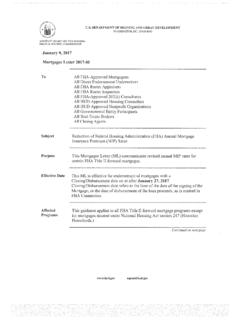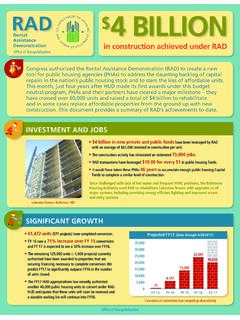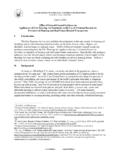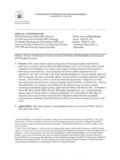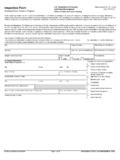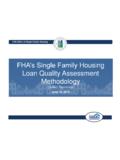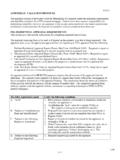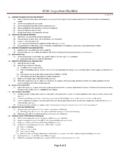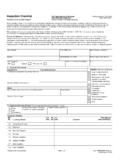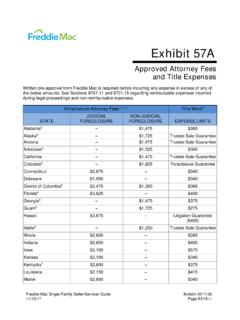Transcription of Mortgagee Letter 2013-26 Date: August 15, 2013 …
1 DEPARTMENT OF HOUSING AND URBAN DEVELOPMENT. WASHINGTON, DC 20410-8000. ASSISTANT SECRETARY FOR HOUSING- FEDERAL HOUSING COMMISSIONER. Mortgagee Letter 2013-26 . Date: August 15, 2013. To: All FHA-Approved Mortgagees Subject back to work - Extenuating Circumstances Purpose The purpose of this Mortgagee Letter (ML) is to: provide minimum underwriting standards and criteria for evaluating borrowers who have experienced an Economic Event, as defined in this ML, that resulted in a severe reduction in income due to a job loss or other circumstances resulting in reduced Household Income;. describe the use of housing counseling to qualify under the provisions of this ML;. amend HUD Handbook , Chapter 4, Section C to add an Economic Event to the list of examples of extenuating circumstances and instruct lenders to use the guidance for back to work . Extenuating Circumstances established in this ML as Chapter 6.
2 Section G, to underwrite an applicant with an Economic Event; and, revise HUD Handbook , , to clarify the process for requesting a review of information contained in CAIVRS for borrowers seeking an FHA-insured mortgage in accordance with the provisions of this ML. Mortgagee Letter 2013-26 Continued Introduction FHA is continuing its commitment to fully evaluate borrowers who have experienced periods of financial difficulty due to extenuating circumstances. As a result of the recent recession many borrowers who experienced unemployment or other severe reductions in income, were unable to make their monthly mortgage payments, and ultimately lost their homes to a pre- foreclosure sale, deed-in-lieu, or foreclosure. Some borrowers were forced to file for bankruptcy to discharge or restructure their debts. Because of these recent recession-related periods of financial difficulty, borrowers' credit has been negatively affected.
3 FHA recognizes the hardships faced by these borrowers, and realizes that their credit histories may not fully reflect their true ability or propensity to repay a mortgage. To that end, FHA is allowing for the consideration of borrowers who have experienced an Economic Event and can document that: certain credit impairments were the result of a Loss of Employment or a significant loss of Household Income beyond the borrower's control;. the borrower has demonstrated full recovery from the event; and, the borrower has completed housing counseling. Housing counseling is an important resource for both first-time home buyers and repeat home owners. Housing counseling enables borrowers to better understand their loan options and obligations, and assists borrowers in the creation and assessment of their household budget, accessing reliable information and resources, avoiding scams, and being better prepared for future financial shocks, among other benefits to the borrower.
4 Effective Date The guidance in this ML is effective for case numbers assigned on or after August 15, 2013 through September 30, 2016. 2. Mortgagee Letter 2013-26 Continued Affected HUD , Mortgage Credit Analysis for Mortgage Insurance Programs Add Chapter 6 section G, back to work Extenuating Circumstances, and the guidance in this ML in its entirety to this new section. Add to section , Previous Mortgage Foreclosure, an Economic Event to the list of examples of extenuating circumstances and instruct lenders to use alternative guidance in Chapter 6. Add to section , Chapter 7 Bankruptcy, instructions to lenders to use alternative guidance in Chapter 6 when the extenuating circumstance is a result of an Economic Event. Note: This ML will serve as Section G until the Handbook can be updated. Applicability The guidance in this ML is applicable to purchase money mortgages in all FHA programs with the exception of Home Equity Conversion Mortgages.
5 Lenders must use the provisions of this ML when considering a borrower who experienced an Economic Event, as defined in this ML, which resulted in a foreclosure, short sale, bankruptcy or other negative impact on their credit, and whose application has been issued a Refer recommendation by TOTAL. Scorecard, or received an Accept/Approve but is manually downgraded. In addition to meeting the guidelines set forth in this ML, loans originated using these criteria must meet all other applicable FHA eligibility and policy criteria. Lenders remain responsible for determining whether the borrower meets all other HUD requirements before approving the loan. 3. Mortgagee Letter 2013-26 Continued Eligibility for Borrowers that may be otherwise ineligible for an FHA-insured mortgage due Borrowers to FHA's waiting period for bankruptcies, foreclosures, deeds-in-lieu, and affected by an short sales, as well as delinquencies and/or indications of derogatory credit, Economic including collections and judgments, may be eligible for an FHA-insured Event mortgage if the borrower can document that the delinquencies and/or indications of derogatory credit are the result of an Economic Event as defined in this ML, has completed satisfactory Housing Counseling, as described in this ML, and meets all other HUD requirements.
6 Definitions An Economic Event is any occurrence beyond the borrower's control that results in Loss of Employment, Loss of Income, or a combination of both, which causes a reduction in the borrower's Household Income of twenty (20) percent or more for a period of at least six (6). months. The Onset of an Economic Event is the month of Loss of Employment/Income. Recovery from an Economic Event is the re-establishment of Satisfactory Credit (as defined on page 5 of this ML) for a minimum of twelve (12) months. The term borrower includes borrowers and co-borrower. Borrower Household Income means the gross income of the borrower and all Household Members, as defined below, for purposes of assessing loss of income. The gross income of each Household Member must be computed in accordance with FHA income requirements. Note: Household Member, for the purpose of this ML, means an individual residing at the borrower's primary residence at the time of the Economic Event and who was a co-borrower on the borrower's previous mortgage.
7 4. Mortgagee Letter 2013-26 Continued Eligibility for Note: Borrower Household Income is used for the purpose of defining Borrowers an Economic Event. Only the income from the borrower, not affected by an Household Income, may be used as Effective Income for the purpose Economic of qualifying for the new loan. Event- Continued Housing Counseling, for purposes of this ML, means counseling from a HUD-approved housing counseling agency related to homeownership and residential mortgage loans that is provided in accordance with 24 part 214 Housing Counseling Program . and satisfies the requirements identified in Satisfactory Housing Counseling. Satisfactory Credit 1. Satisfactory Credit: Requirements The lender may deem a borrower to have Satisfactory Credit if: the borrower's credit history is clear of late housing or installment debt payments, and major derogatory credit issues on revolving accounts.
8 Any open mortgage is current and shows twelve (12) months satisfactory payment history. Mortgages may have been brought current through loan modification, which may be temporary or permanent so long as all payments have been documented as being received in accordance with the modification agreement(s); and the borrower meets the requirements of this ML. 5. Mortgagee Letter 2013-26 Continued Eligibility for When evaluating a borrower with non-traditional credit history, the lender Borrowers may deem a borrower to have Satisfactory Credit if the borrower's non- affected by an traditional credit history covering at least twelve (12) months in duration Economic includes: Event- Continued no history of delinquency on rental housing payments; and no more than one thirty (30) days delinquency on payments due to other creditors; and no collection accounts/court records reporting (other than medical and/or identity theft).
9 Refer to Handbook Chapter 4 Section C for more information on analyzing a borrower with non-traditional credit history. 2. Satisfactory Credit: Required Documentation The lender must verify and document a reduction in the borrower's Household Income of twenty (20) percent or more for a period of at least six (6) months that resulted from the Loss of Employment, Loss of Income, or a combination of both. A. Loss of Employment The lender must verify and document the Loss of Employment by obtaining: A written Verification of Employment (VOE) evidencing the termination date or in cases where the prior employer is no longer in business: o a written termination notice, or o other publicly available documentation of the business closure, and o documentation of receipt of unemployment income. 6. Mortgagee Letter 2013-26 Continued Eligibility for B. Loss of Income Borrowers affected by an The lender must verify and document the Borrower's Household Income prior Economic to Loss of Income by obtaining: Event- a written VOE evidencing prior income; or Continued signed tax returns or W-2s evidencing prior income.
10 For a Loss of Income based on seasonal employment, the lender must verify and document a two year history of seasonal employment in the same field just prior to the Loss of Income, in addition to meeting the documentation requirement above. For a Loss of Income based on part-time employment, the lender must verify and document a two year history of continuous part-time employment just prior to the Loss of Income in addition to meeting the documentation requirement above. C. Post Economic Event Income The lender must verify and document the Borrower's Household Income after the onset of the Economic Event in accordance with the guidance in Handbook Chapter 4 sections D-E & ML 12-3. 3. Satisfactory Credit: Analysis The lender must then analyze the documentation to determine the Loss of Employment and/or Loss of Income resulted in a minimum twenty (20). percent reduction in income for a minimum of six (6) months.
